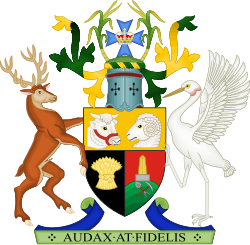| District Court of Queensland | |
|---|---|
 | |
 Cairns Courthouse, a permanent location for the District Court | |
| Established | 1866–1921; 1958 |
| Jurisdiction | |
| Location | Queen Elizabeth II Courts of Law in Brisbane; Beenleigh; Cairns; Ipswich; Maroochydore; Rockhampton; Southport, Townsville |
| Composition method | Vice-regal appointment upon nomination by the Premier following the advice of the Attorney-General and Cabinet |
| Authorised by | Queensland Parliament via the: District Court Act 1967 (QLD) |
| Appeals to | Supreme Court of Queensland |
| Appeals from | Magistrates Court of Queensland |
| Judge term length | mandatory retirement by age of 70 |
| Number of positions | 39 |
| Website | www.courts.qld.gov.au |
| Chief Judge | |
| Currently | Brian Devereaux SC |
| Since | 17 August 2020 |
The District Court of Queensland(QDC) is the second tier in the court hierarchy of Queensland, Australia. [1] The Court deals with serious criminal offences such as rape, armed robbery and fraud. Juries are used to decide if defendants are guilty or not guilty.
Contents
- Jurisdiction
- Civil
- Criminal
- Composition
- Chief Judge of the District Court
- Judges of the District Court
- See also
- References
The original court was established in 1866 to ease the workload of the Supreme Court of Queensland. However, in 1921 the Queensland Parliament decided District Courts were no longer necessary and the courts were abolished. They were re-established by Parliament in 1958, again to relieve the workload in the Supreme Court. The present court is constituted under the District Court of Queensland Act 1967 (Qld). [2] That Act amalgamated the previous District Court in existence prior to 1967 into the new District Court.
The District Court sits in 32 locations across Queensland. Judges also travel throughout the state to hear matters in regional and remote areas.
Decisions made by the District Court may be heard on appeal to the Supreme Court; and the District Court may sit as an appellate court for decisions made in the Magistrates Court of Queensland. [1] The unreported judgments of the District Courts is published on the Queensland Judgments website.